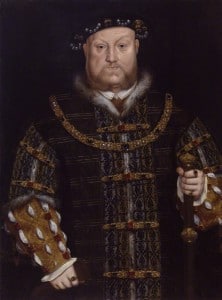 OK, time for a controversial soap-box article…
OK, time for a controversial soap-box article…
Today is Henry VIII’s birthday so Henry VIII is being discussed on various Facebook pages and one link which is being shared is Sky News’ article “Henry VIII would be a modern day psychopath” in which Henry “scored 174 against a ‘starting’ psychopath score of 168” according to Professor Kevin Dutton. Dutton goes on to say that “He scored very highly for emotional detachment and cold-hearted ruthlessness – both characteristics of dangerous psychopaths.”
Now, I do not condone the atrocities carried out in Henry VIII’s reign – the executions of the Carthusian martyrs, the framing of Anne Boleyn, the massacres of the Pilgrimage of Grace, the execution of the elderly Margaret Pole etc. etc. – but I do have a problem with a sixteenth century monarch being labelled a psychopath. Surely a psychologist actually needs to spend time with someone before diagnosis, surely they need to understand the context in which they lived… I am baffled by this “diagnosis” and it’s just plain wrong in my eyes.
Whatever we feel about Henry VIII, we can never fully understand the context in which he lived and the pressures that were on him. We have the freedom of living in the 21st century whereas Henry VIII lived in a society where men ruled, which was both religious and highly superstitious, and where it was believed that a monarch was God’s anointed and appointed sovereign. The Tudor dynasty was also in its infancy. It was not long after the Wars of the Roses, so Henry VIII felt that his duty was to secure the throne and the succession; in short, he had to have a son, and that ‘duty’ affected how he treated Catherine of Aragon and Anne Boleyn. From my research into Henry VIII, I’ve come to believe that his beliefs were not borne out of convenience, he truly believed that the lack of a male heir pointed to a problem with his marriages: God was not blessing him because there was something wrong. What we have to remember is that this was a time when a strawberry birthmark was thought to be caused by a pregnant woman eating strawberries or drinking red wine, and a harelip could be caused by seeing a hare while pregnant. Our 21st century thinking, our understanding of the world and the world of science, make it impossible to understand Henry VIII, the way he thought and the way he viewed the world.
Henry VIII was a product of the world in which he lived and he was a successful King; he passed the crown to his son, Edward VI, without war or rebellion. Whatever we believe about his role in the fall of Anne Boleyn, we cannot judge him because we have not walked a mile in his shoes and we can only go on what was said about him, the letters he wrote, the actions he carried out… We have not got the man in front of us and we do not know the full story. He was what he was and I am what I am; I cannot judge him. Does God have a sliding scale of sin? Are his sins any worse than mine? Hmmm….
On Henry VIII’s birthday, I choose to remember the man who had a brilliant mind, the humanist, Renaissance Prince, the sportsman and jouster, the musician, the man who Catherine of Aragon, Anne Boleyn and Jane Seymour fell in love with, the man Thomas More had so much hope for when he was crowned in 1509… Bluff King Hal. Whatever you were/are, Henry, you are still causing debate over 500 years later and we remember you. We delight in your story and you will live on.